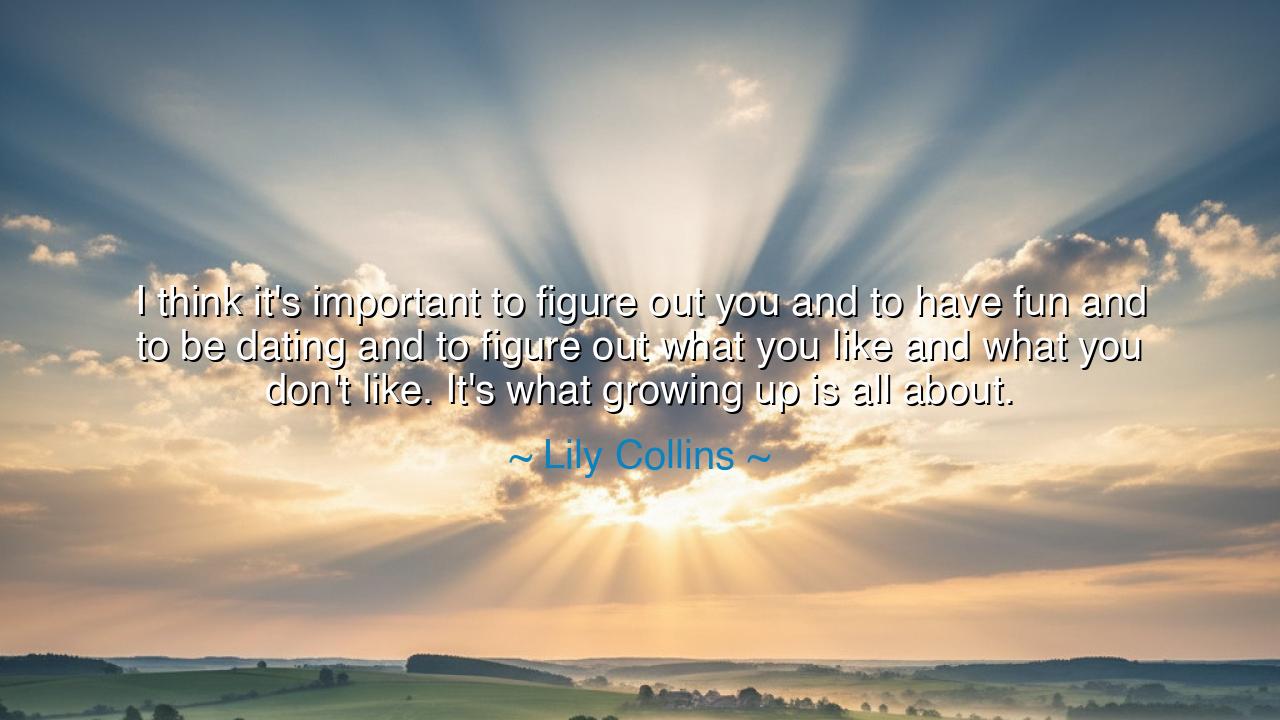
I think it's important to figure out you and to have fun and to
I think it's important to figure out you and to have fun and to be dating and to figure out what you like and what you don't like. It's what growing up is all about.






In the book of becoming, a gentle command is set down like a lantern at dusk: “I think it’s important to figure out you and to have fun and to be dating and to figure out what you like and what you don’t like. It’s what growing up is all about.” So speaks Lily Collins, and her words move with the calm courage of someone who has walked the narrow bridge between self-discovery and companionship. The sentence honors play as a teacher, curiosity as a compass, and experience as the road by which the soul learns its own weight and wing.
To figure out you is not a selfish errand; it is the first duty of a life offered to others. How can a cup pour if it has never learned its measure? In early seasons the heart is a chorus of borrowed voices—family, friends, fashions, fears. Only through testing—saying yes, saying no, risking silence and song—does the single clear line emerge. Thus the charge to have fun is more than permission to laugh; it is the wisdom to treat exploration as play, to hold experiments lightly so that shame does not freeze the lesson before it forms.
Dating in this vision is a school rather than a stage, a workshop rather than a verdict. You enter not to audition for approval but to practice attention: listening for the pulse of delight and the tug of discomfort, learning what you like—kindness, curiosity, steady humor—and what you don’t like—covert cruelty, performative charm, the fog of poor communication. Each conversation is a small mirror; each goodbye, a page of notes. In time, patterns appear like constellations, and the traveler who once wandered now navigates by stars they can finally name.
History keeps a companion tale. Simone de Beauvoir and Jean-Paul Sartre—however one judges their philosophy—treated relationship as a solemn experiment in candor. They named their terms, wrote their doubts, recorded their desires; they tested the boundary between freedom and faithfulness with relentless clarity. Their story is not a template for all, yet it proves the point: adults are forged where people dare to ask and answer, to revise and recommit. Even the ancients understood this: the Delphic call to “know thyself” was not carved for hermits alone but for citizens whose love and labor would shape the city.
Let a humbler story walk beside the famous. Mira, twenty-three, kept a small ledger titled “Growing Up.” After each date she wrote three lines: “What brightened?” “What dimmed?” “What did I learn about me?” She discovered she loved late-night bookstores and loathed half-listening; she thrived with people who asked follow-up questions and withered around constant one-upmanship. Months later, when she met someone who matched her cadence, she recognized it—not by thunderbolt, but by the quiet fit of familiar truths. The ledger had turned noise into knowledge.
The heart of the quote is its order: figure out you, have fun, date, discern what you like and what you don’t, and thereby grow up. Reversing the order—seeking a partner to supply identity—invites hunger without end. Maturity is the fruit of practiced preferences; integrity is the courage to keep them when dazzled; compassion is the grace to let others keep theirs when they differ. In this way, self-knowledge does not shrink love; it strengthens it, giving two whole people something honest to exchange.
Take these provisions for the road. (1) Keep a “likes/limits” journal—name five joys and five non-negotiables; revise monthly. (2) Treat first meetings as curiosity walks: two open questions, two stories, one clear boundary. (3) Schedule fun on purpose—hobbies, travel, art—so romance is an addition, not a replacement, for aliveness. (4) Practice clean exits: thank, state truth kindly, and step away; every “no” is scaffolding for a better “yes.” (5) Share your findings with trusted friends or mentors—the council of elders keeps us brave. Do these, and you will fulfill the wisdom of the line: a life that learns by living, loves by knowing, and grows up by choosing—until, one day, you recognize yourself, and those who meet you recognize home.






AAdministratorAdministrator
Welcome, honored guests. Please leave a comment, we will respond soon